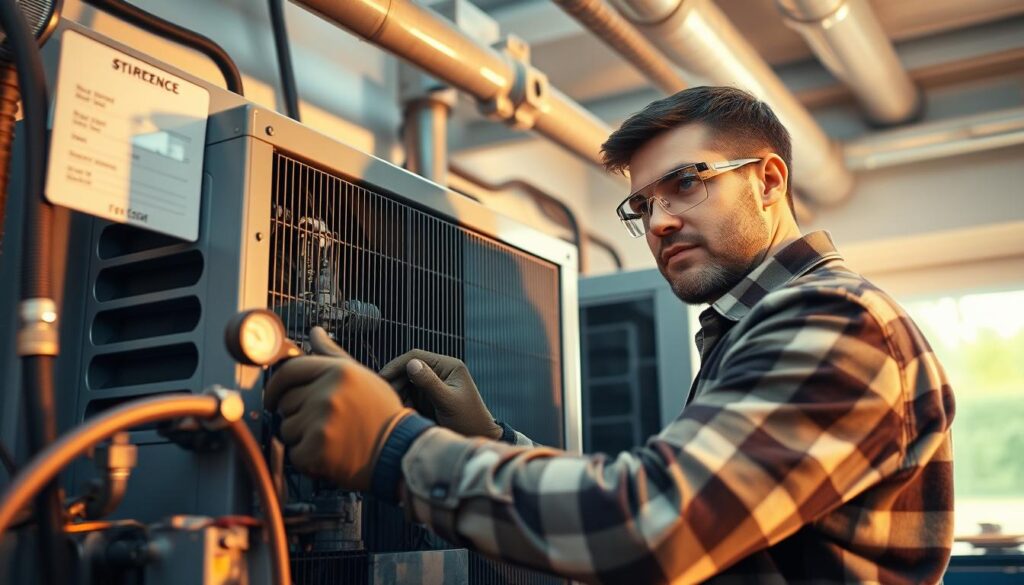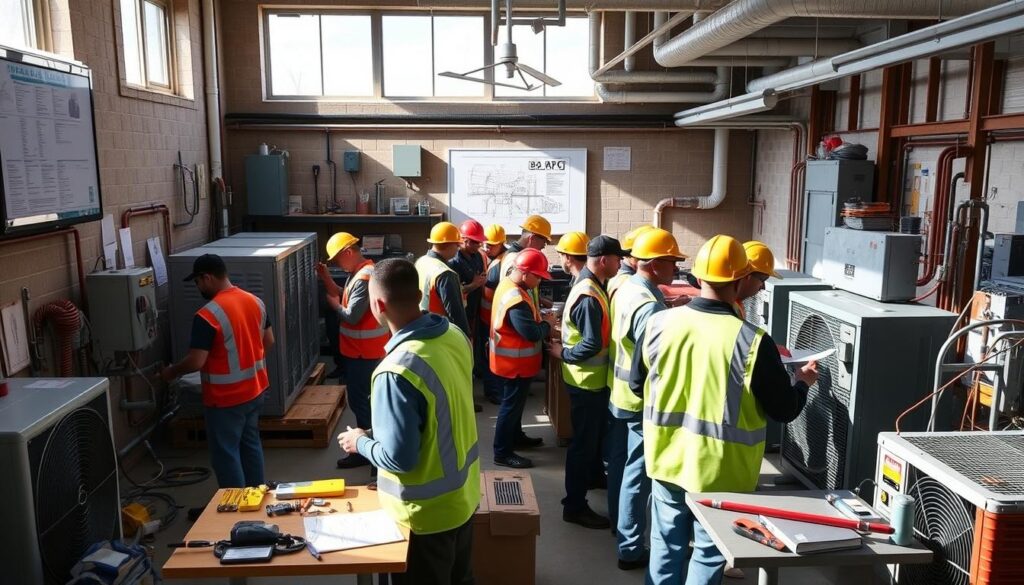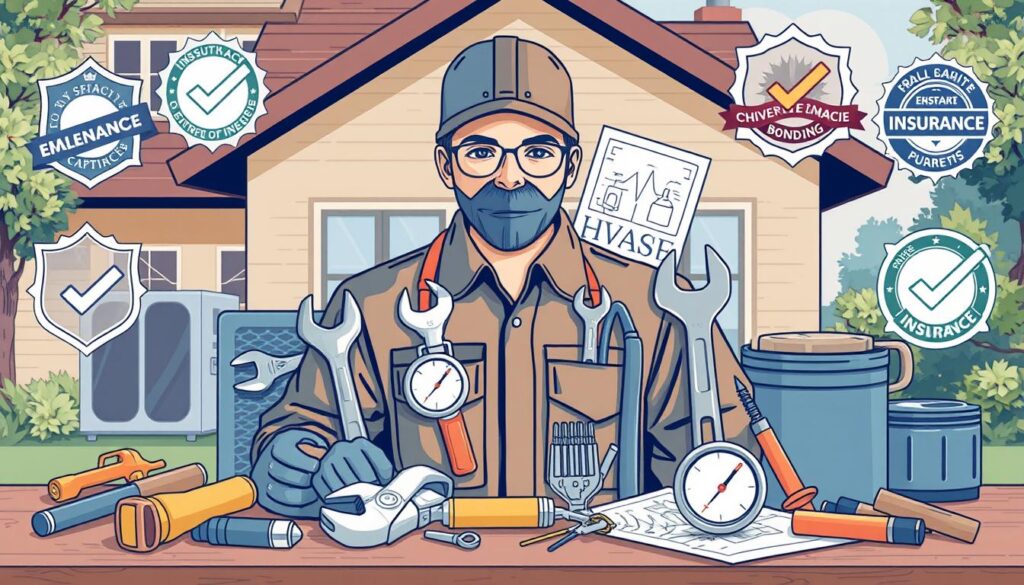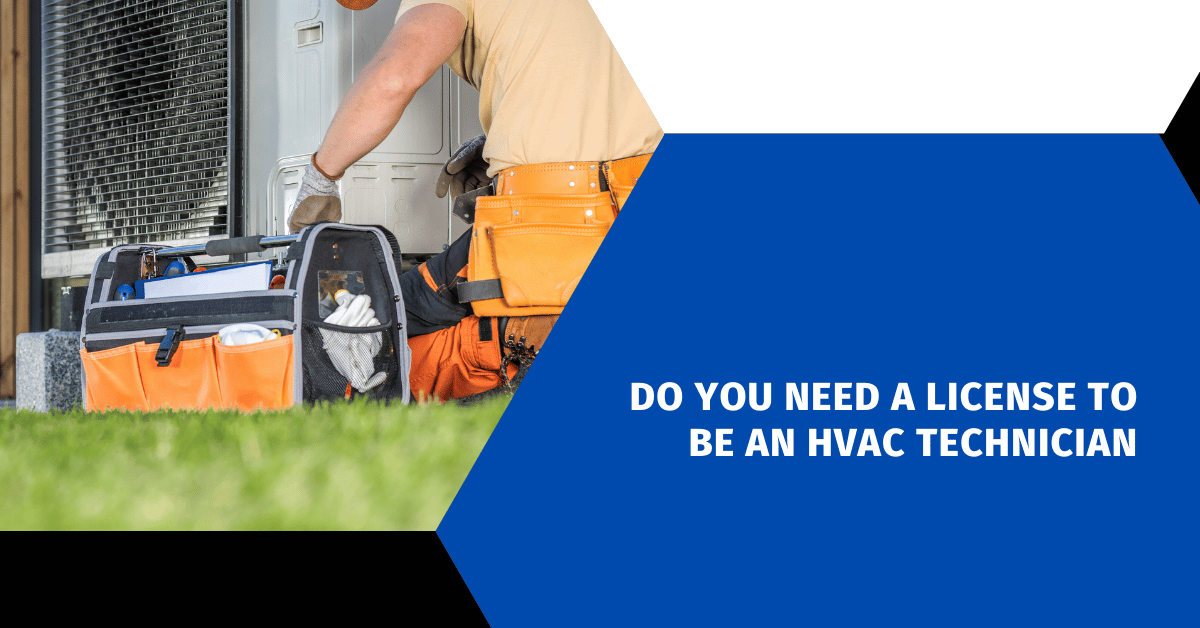Affiliate Disclosure
HVAC Guide Guys is a participant in the Amazon Services LLC Associates Program, an affiliate advertising program designed to provide a means for sites to earn advertising fees by advertising and linking to Amazon.
Do You Need a License to Be an HVAC Technician In Phoenix, the sun shines all year, making air conditioning a must. Emma, a skilled HVAC technician, works hard to keep places cool. She thinks about how she got here, reflecting on her journey.
Emma had to deal with licensing and certification to work legally in Arizona. She got EPA certifications and passed tough exams. It was tough, but it was worth it.
This article will cover HVAC licensing across the U.S. We’ll see why licensing is key for safety and quality. Whether you’re new or experienced, this guide will help you understand licensing and succeed.

Key Takeaways:
- HVAC technicians usually need a license to work legally in most states
- Licensing rules differ by state, with some needing state licenses and others local ones
- To get licensed, you typically need to finish an apprenticeship or education, get work experience, and pass exams
- Everyone needs a federal EPA Section 608 certification to handle refrigerants
- Licensing makes sure HVAC technicians follow industry standards and can legally work
Table of Contents
Understanding HVAC Licensing Requirements in the United States
The HVAC industry in the U.S. is very regulated. There are many federal, state, and local rules that technicians must follow. Knowing these rules is key for anyone wanting to work in HVAC.
Federal vs. State Requirements
The EPA requires HVAC techs to have an EPA Section 608 certification for refrigerant work. This certification is a one-time exam on handling and storing refrigerants. Without it, techs can’t legally work with refrigerants.
EPA Section 608 Certification Basics
The EPA Section 608 program makes sure HVAC techs manage refrigerants correctly. The exam tests knowledge on four types of refrigerants. It covers how to handle, store, and recycle them.
The Importance of Proper Licensing
Many states and local areas have their own HVAC licensing rules. These can include work experience, training, and passing exams. Getting the right license is important. It shows techs have the skills to do good work, keeps customers safe, and lets them legally work and get insurance.
| State | HVAC Licensing Requirements |
|---|---|
| Alabama | Proof of at least 3,000 hours of work experience under a licensed contractor before taking the contractor’s license exam. |
| Alaska | HVAC businesses are categorized under specialized licensing categories like Heating, Cooling, and Process Piping (HCPP) or Unlimited Refrigeration (UR). |
| Arizona | Three types of HVAC contractor licenses: Specialty Commercial C-39, Specialty Residential R-39, and Specialty Dual CR-39. |
Understanding HVAC licensing rules is crucial for technicians. It ensures they can work legally and safely. Proper licensing also protects the technician and the customer. It’s often needed to get insurance and bid on HVAC jobs.
Explore Our HVAC Shop
Looking for top-rated HVAC tools, parts, and accessories? Visit our shop and find the perfect solution for your needs.
Visit the ShopCareer Opportunities and Income Potential in HVAC
The HVAC industry in the United States has many career paths and good pay. HVAC technicians make about $8,600 more than the average job, which is $50,590. This makes it a great career choice.
Jobs in HVAC are secure, with a 19% increase in new positions by 2030. This growth comes from more people wanting energy-efficient systems and regular maintenance.
There are chances to move up in HVAC careers. You can go from apprentice to journeyman and then to master technician. You can also specialize in different areas like commercial or residential systems. Some even start their own HVAC businesses.
| HVAC Salary in California | Median Salary | Salary Range |
|---|---|---|
| HVAC Mechanic | $48,898 | $40,399 – $60,500 |
HVAC training in California costs between $500 and $30,000. Apprenticeships last 3-5 years. They mix classroom learning with hands-on training with experienced technicians.
The HVAC industry is booming, offering a stable and well-paying job. You can choose from apprenticeships, certifications, or starting your own business. There are many ways to succeed in this field.
Basic Requirements for HVAC Technician Licensing
To become a licensed HVAC technician in the United States, you need to meet several key requirements. First, you must be at least 18 years old and have a high school diploma or GED. A clean criminal background check is also required to ensure public safety and trust in the HVAC profession.
Educational and Experience Prerequisites
The educational and experience needs for HVAC licensing vary by state. But, they often include formal training and on-the-job experience. Many states require an HVAC apprenticeship program or a formal training program at a technical school or community college. This can range from 2,000 to 8,000 hours of supervised work experience.
| State | Educational Requirement | Experience Requirement |
|---|---|---|
| California | High school diploma or GED | Minimum of 4 years of documented journeyman work experience |
| Texas | Formal HVAC training program | 2,000 hours of on-the-job training |
| Florida | HVAC apprenticeship program | 4 years of HVAC experience |
Some states may also ask for an associate’s degree in HVAC technology or a similar field. Criminal background checks are common to ensure the safety and integrity of the HVAC industry.
By meeting these basic requirements, aspiring HVAC technicians can start their journey towards getting the necessary licenses and certifications. This will allow them to work in this in-demand field.
Types of HVAC Licenses and Certifications
Licenses and certifications are key in HVAC. They show what work a technician can do legally. Each state has its own rules and licenses.
The EPA Section 608 Certification is well-known. It’s needed for those who work with refrigerant. It helps keep the environment safe.
Technicians might also get NATE certifications. These are not always needed but show a technician’s skills. Employers often look for them.
In places like Illinois, licensing is different. There’s no state license, but cities might have their own tests. For example, Chicago has licenses for projects of different sizes.
There are also specialty licenses. These are for areas like solar systems or commercial refrigeration. Technicians with these licenses can handle complex jobs.
The license a technician has affects their work. Knowing about different licenses is important for HVAC pros.
“The type of HVAC license often determines the scope of work a technician can legally perform.”
Explore Our HVAC Shop
Looking for top-rated HVAC tools, parts, and accessories? Visit our shop and find the perfect solution for your needs.
Visit the ShopDo You Need a License to Be an HVAC Technician
The need for an HVAC license depends on where you are. In the U.S., some states require a license for HVAC work. Others let local areas decide on licensing. Knowing the rules in your area is key for HVAC pros.
State-Specific Requirements
In places like Colorado, Illinois, and Kansas, there’s no state license needed. But, cities and counties might have their own rules. On the other hand, Texas and Florida have strict state licensing with different levels and insurance needs.
Local Jurisdiction Rules
Even without state laws, local places might need permits or registrations. Always check the rules of the city, county, or town you work in. This ensures you follow the law.
Working Without a License: Consequences
Doing HVAC work without a license can cause big problems. You might face fines, legal trouble, and lawsuits. It can also hurt your job chances and getting insurance. Always get the right state HVAC licenses and local HVAC regulations before starting unlicensed HVAC work.
Dealing with HVAC licensing rules can be tough. But, it’s crucial for your business’s success and legality. By knowing the rules in your area, you can offer top-notch service to your customers.
HVAC Apprenticeship Programs and Training
Becoming an HVAC technician often means doing an apprenticeship. This combines learning by doing with classroom lessons. These apprenticeships last 3 to 5 years, with 2,000 to 3,000 hours of work each year.
In the first year, apprentices help and watch experienced technicians. They start doing more complex tasks as they get better.
Trade schools or community colleges also offer HVAC training. These programs last from 6 months to 2 years. They teach important topics like HVAC theory and safety.
Some states let formal education count as part of the apprenticeship hours.
| HVAC Apprenticeship Statistics | Value |
|---|---|
| Average Apprenticeship Duration | 3-5 years |
| Annual On-the-Job Training Hours | 2,000 to 3,000 |
| In-School Training Hours | 720 |
| Minimum Passing Grade on Final Exam | 70% |
| Average HVAC Apprentice Salary | $24,315 per year ($12.16 per hour) |
| Average Experienced HVAC Technician Salary | $39,105 per year ($19.55 per hour) |
HVAC apprenticeships lead to rewarding careers with good pay and benefits. Whether you pick an apprenticeship or formal training, a solid education is key. With hard work and the right start, you can have a fulfilling HVAC career.

State-by-State Licensing Variations
HVAC licensing rules change a lot from state to state in the U.S. Some states have one set of rules for the whole state. Others let local areas make their own rules.
Different License Classifications
HVAC licenses can be different in each state. For example, California needs a contractor’s license for any HVAC job over $500. Florida has four types of HVAC contractor licenses, each with its own rules and needs. Alaska uses a Mechanical Administrator license for HVAC pros.
Each state has its own license types for different HVAC jobs. Technicians might need different licenses for residential, commercial, or specialty HVAC work.
Reciprocity Agreements Between States
Some states have agreements that let HVAC techs work in other states without extra exams. But these agreements aren’t the same everywhere.
About 52% of states have HVAC license reciprocity with others. The cost to apply for an HVAC license varies, with a median of $150 and a max of $450. The median license fee is $200, with a max of $580.
In states without statewide HVAC licensing, the median application fee is $80, with a max of $254.
Explore Our HVAC Shop
Looking for top-rated HVAC tools, parts, and accessories? Visit our shop and find the perfect solution for your needs.
Visit the ShopInsurance and Bonding Requirements
As an HVAC professional, it’s key to protect your business with the right insurance and bonding. Many states need HVAC contractors to have liability insurance and surety bonds. This protects both the contractor and their clients.
Liability insurance for HVAC businesses usually includes general liability, property damage, and workers’ compensation. The bond amounts vary, from $10,000 to $25,000 or more. For example, California requires a $15,000 contractor license bond for HVAC contractors.
These financial protections are often needed to get and keep an HVAC contractor’s license. They help reduce risks from lawsuits, theft, and property damage. This gives you peace of mind that your business investments are safe.
| Insurance Type | Key Coverage |
|---|---|
| HVAC Business Insurance | Covers repair costs for property damage, physical injuries, HVAC installation problems, and moisture damage. |
| HVAC Contractor Bond | Protects clients from financial losses due to contractor misconduct or failure to complete a job. |
| Liability Insurance for HVAC | Covers collision damage to another driver’s vehicle, property damage, and medical bills from third-party injuries. |
The insurance and bonding needs for HVAC pros can change based on company size, location, and services. It’s vital to check and follow your state’s rules. This ensures your business is well-protected and licensed.

Exam Preparation and Application Process
To get an HVAC license, you must pass two exams. The first is on trade knowledge, covering HVAC theory, system design, and safety. The second is on business and law, including contract law and state regulations.
Preparation includes study guides, practice tests, and review courses. Exam costs vary from $100 to $300, based on your location and the licenses you seek. You’ll need to show proof of experience, education, and pay fees to apply.
Trade Knowledge Testing
The trade exam tests your technical skills in HVAC. It covers many topics, such as:
- HVAC system design and installation
- Troubleshooting and maintenance procedures
- Refrigeration principles and applications
- Electrical systems and controls
- Safety regulations and best practices
Good preparation is key to passing this exam and showing your HVAC skills.
Business and Law Examinations
You also need to pass a business and law exam. This part of the process checks your knowledge of running an HVAC business, like:
- Contract law and liability
- Business management and accounting
- Permits, licenses, and regulations
- Customer service and communication
Knowing these topics well will help you pass the exam and succeed in your HVAC career.
| Exam Preparation Tip | Description |
|---|---|
| Utilize Study Guides | Invest in comprehensive study guides that cover the full breadth of the HVAC license exam topics. |
| Take Practice Tests | Practice taking sample exams to identify your strengths and weaknesses, and improve your test-taking skills. |
| Enroll in Review Courses | Consider joining a structured review course to receive expert guidance and targeted preparation for the exams. |
Explore Our HVAC Shop
Looking for top-rated HVAC tools, parts, and accessories? Visit our shop and find the perfect solution for your needs.
Visit the ShopLicense Maintenance and Renewal Requirements
As an HVAC technician, keeping your license up to date is key. Licenses usually need to be renewed every year or two, depending on where you live. To renew, you’ll need to pay a fee and finish continuing education courses. These courses help you learn about new technologies and safety rules.
How much education you need to renew your HVAC license changes by state. You might take classes, workshops, or online courses. These cover things like setting up systems, keeping them running, and fixing problems. Some places also ask for proof of insurance and bonding. If you don’t renew, you could lose your license or have to start over.
It’s important to keep your HVAC license current. This way, you can keep giving your customers the best service. By doing the required continuing education for HVAC and meeting all the renewal rules, you show you’re serious about your work.
| Requirement | Details |
|---|---|
| Renewal Frequency | Annual or biennial, depending on the state |
| Renewal Fees | Vary by state, typically ranging from $50 to $300 |
| Continuing Education | 4-16 hours per renewal period, covering industry advancements and safety regulations |
| Insurance and Bonding | Some states require proof of ongoing coverage |
| Consequences of Non-renewal | License suspension or the need to reapply and retake exams |
By knowing the HVAC license renewal rules in your area and following them, you keep your skills sharp. This lets you keep helping your community with top-notch services.
Conclusion
Becoming a licensed HVAC technician is a great career choice. It offers strong job security and good pay. Licensing rules differ by state but ensure technicians meet industry standards.
The HVAC industry growth is driven by the need for energy-efficient systems. This growth means lots of job opportunities for skilled workers. It’s important to understand the HVAC licensing importance and keep learning to succeed in this field.
The HVAC licensing process is detailed. It includes education, work experience, and passing exams. This ensures technicians know how to work with HVAC systems safely and well.
This dedication to being a professional is why clients and peers trust licensed HVAC technicians. They are respected for their skills and knowledge.
The HVAC industry is always changing. Keeping up with new rules, techniques, and technologies is key. This way, HVAC technicians can have a successful career and help the field grow.
Whether you’re new to HVAC or have lots of experience, getting and keeping your license is crucial. It’s the way to excel in this exciting and rewarding field.

